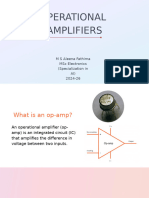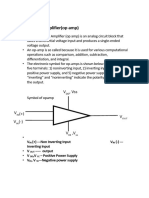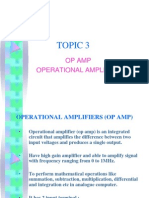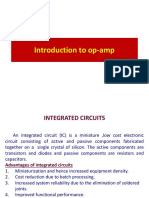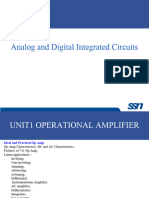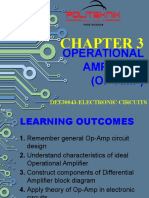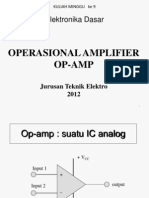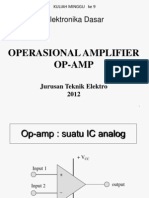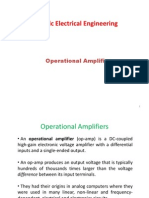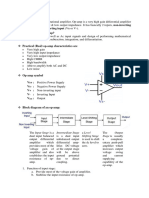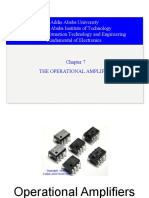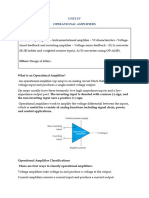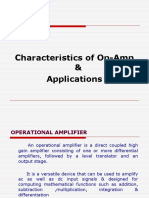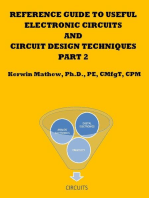Presentation On OP-AMP
Presentation On OP-AMP
Uploaded by
Rashmi MittalCopyright:
Available Formats
Presentation On OP-AMP
Presentation On OP-AMP
Uploaded by
Rashmi MittalOriginal Title
Copyright
Available Formats
Share this document
Did you find this document useful?
Is this content inappropriate?
Copyright:
Available Formats
Presentation On OP-AMP
Presentation On OP-AMP
Uploaded by
Rashmi MittalCopyright:
Available Formats
OPERATIONAL AMPLIFIER
Submitted by:
OPERATIONAL AMPLIFIER
OP- AMP is a solid state device
capable of sensing and amplifying dc
and ac input signals.
OP- AMP is a high gain differential
amplifier with nearly ideal external
characteristics.
OP-AMP COMPONENTS
Transistors
Resistors
Diodes
Capacitors
OP-AMP STAGES
NON
INVERTING
INPUT
INVERTING
INPUT
OUTPUT
DUAL-INPUT
BALANCED
OUTPUT
DIFFERENTIAL
AMPLIFIER
DUAL-INPUT
UNBALANCED
OUTPUT
DIFFERENTIAL
AMPLIFIER
EMITTER
FOLLOWER
WITH
CONSTANT
CURRENT
SOURCE
COMPLEMENTARY
SYMMETRY
PUSH-PULL
AMPLIFIER
CIRCUIT SYMBOL
The OP-AMP is represented by a
triangular symbol.
It has two input and one output
terminals.
EQUIVALENT CIRCUIT
Non Inverting
Input
Inverting
Input
Output
V
out
= G(v
1
-v
2
)
1
2
CHARACTERSTICS OF IDEAL
OP-AMP
CHARACTERISTICS IDEAL VALUES
Voltage gain
Input impedance
Output impedance
0
Bandwidth
Input offset voltage
0
Input offset current
0
Slew rate
CMRR ratio
OP-AMP CONFIGURATIONS
No feedback
Non Linear
Limited
Bandwidth
Feedback
Linear
Bandwidth
infinite
INVERTING OP-AMP
An inverting amplifier uses negative
feedback
to invert and amplify a voltage.
Output is 180 out of phase.
For the non-inverting amplifier the input is
connected to the non-inverting input.
Output is in phase with the input.
NON-INVERTING OP-AMP
A particular form of this amplifier is when the
feedback loop is a short circuit, I.e. R2 = 0. Then
the voltage gain is 1, such an amplifier is called a
Voltage Follower.
(GROUND)
VOLTAGE FOLLOWER
V
out
= V
in
An inverting amplifier can accept two or more inputs
and produce a weighted sum
At X, I = I
A
+ I
B
+ I
C
=
-(V
A
/R
A
+V
B
/R
B
+V
C
/R
C
)
SUMMING AMPLIFIER
|
|
.
|
\
|
+ + =
C
C
2
B
B
2
A
A
2
out
.V
R
R
.V
R
R
.V
R
R
V
V
A
V
B
V
C
SUBTRACTOR AMPLIFIER
Amplifies the difference between the two voltages
applied at the two ends of the amplifier.
Neither of the input lines is grounded.
Noise appearing at both the input terminals does
not appear at the output.
Integrator produces an output voltage which is
proportional to the time integral of the input voltage
Integrating both sides gives
INTEGRATOR AMPLIFIER
.dt V
RC
1
dV
in out
=
( ) ( )
}
=
2
1
t
t
in 1 out 2 out
.dt V
RC
1
t V t V
The function of an differentiator is to give an
output voltage which is proportional to the
rate of input voltage.
DIFFERENTIATOR AMPLIFIER
PRACTICAL APPLICATIONS
Perform math operations
ADC and DAC
Sign changer
Voltage Regulation
Pulse generators
Wave generator
You might also like
- Inverting Amplifier Configuration of an Operational AmplifierNo ratings yetInverting Amplifier Configuration of an Operational Amplifier12 pages
- Introduction of Op-Amp: Block Diagram, Differential and Common Mode OperationNo ratings yetIntroduction of Op-Amp: Block Diagram, Differential and Common Mode Operation65 pages
- UNIT3 - Introduction To IC Technology - 290617 - EditedNo ratings yetUNIT3 - Introduction To IC Technology - 290617 - Edited82 pages
- 5. Lecture 5 - Operational Amplifier - UpdatedNo ratings yet5. Lecture 5 - Operational Amplifier - Updated70 pages
- Introduction To Operational Amplifier: UNIT-1No ratings yetIntroduction To Operational Amplifier: UNIT-124 pages
- Analog Circuits: A. A. Lande, E & TC DeptNo ratings yetAnalog Circuits: A. A. Lande, E & TC Dept96 pages
- Operational Amplifiers: David Lomax Azeem Meruani Gautam JadhavNo ratings yetOperational Amplifiers: David Lomax Azeem Meruani Gautam Jadhav28 pages
- Operational Amplifiers: David Lomax Azeem Meruani Gautam JadhavNo ratings yetOperational Amplifiers: David Lomax Azeem Meruani Gautam Jadhav28 pages
- 1. Introduction to Operation AmplifiersNo ratings yet1. Introduction to Operation Amplifiers24 pages
- Characteristics of Op-Amp & ApplicationsNo ratings yetCharacteristics of Op-Amp & Applications36 pages
- Reference Guide To Useful Electronic Circuits And Circuit Design Techniques - Part 2From EverandReference Guide To Useful Electronic Circuits And Circuit Design Techniques - Part 2No ratings yet
- Inverting Amplifier Configuration of an Operational AmplifierInverting Amplifier Configuration of an Operational Amplifier
- Introduction of Op-Amp: Block Diagram, Differential and Common Mode OperationIntroduction of Op-Amp: Block Diagram, Differential and Common Mode Operation
- UNIT3 - Introduction To IC Technology - 290617 - EditedUNIT3 - Introduction To IC Technology - 290617 - Edited
- Operational Amplifiers: David Lomax Azeem Meruani Gautam JadhavOperational Amplifiers: David Lomax Azeem Meruani Gautam Jadhav
- Operational Amplifiers: David Lomax Azeem Meruani Gautam JadhavOperational Amplifiers: David Lomax Azeem Meruani Gautam Jadhav
- Reference Guide To Useful Electronic Circuits And Circuit Design Techniques - Part 2From EverandReference Guide To Useful Electronic Circuits And Circuit Design Techniques - Part 2





